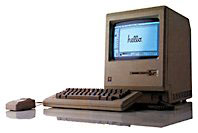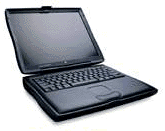Miscellaneous Ramblings
Silence Is Golden: The Quest for Quiet Computing
Charles W. Moore - 2001.03.08
In many respects, winter is my favorite season. On the balance, it is the prettiest time of year in these parts, rivaled only by the new foliage in early to mid June (if you can see it through the clouds of black flies), the goldenness of late August and early September, and the fall colors in a good year.
I'll concede that cybercommuting puts a different complexion on winter, and it's a lot easier to appreciate its beauty when you don't have to get into a cold car every morning and fight traffic on icy, slushy roads.
We heat with wood, and, despite the incredible amount of work it takes to split, pile, dry, move inside, and repile a winter's firewood before you burn a single stick, another of the things I like most about winter is the wood stove. There's nothing quite like wood heat for cosyness. Actually, we have two stoves, but most of the time keep only one lit due to the exigencies noted in the penultimately preceding sentence.
If you have ever battled allergies, you will understand another factor that makes me a winterphile. Mold counts are low, and there's no pollen and other plant-generated xenobiotics in the air. No insects. Crisp, clear air and Christmas card landscapes. I love it.
I also prefer winter for hiking the woodland trails on our property. The boggy bits and lakes are frozen over, and, if the snow isn't too deep, the footing is better. That has not been the case this winter, which is the snowiest we've had in about fifteen years. It's fine if you can stay on top of the crust, but if you go crashing through in some places you're up to your thighs.
The deep snow is also hard on the deer, of which there seem to be many this year. We frequently see groups have three or four in the front yard. They seem to have discovered that my trampled down hiking trails are a better trip than slogging through two feet of snow, and while I'm glad I'm making their lives a little easier, their small deer feet and my size 11 the Greb Canadian Army issue clodhoppers have a radically different profile, so all the deer traffic is making the trail pretty rough these days
Another thing it's impossible not to notice is that deer don't much care where they relieve themselves, and unless there's a deer with serious kidney problems, there must be quite a few of these animals using my trails. Which puts me in mind of a song by the charming Newfoundland musical ensemble, Buddy Wassisname And The Other Fellers, that goes something like: "Peein' in the snow, and gazin' down the hole, is the closest thing we're gonna get to spring" - or words to that effect.
Which in turn calls to mind the travails of the Hollywood film crew that is shooting "The Shipping News" in Halifax, which is standing in for an industrial town in upstate New York. The shooting schedule called for speeding up the arrival of Spring a good month and a half before even the most optimistic locals would expect it. No problem. They just rented some steam jennies and melted all the snow in the whole neighborhood. Well, actually there was a problem. The next day, Halifax got eight inches of snow. The steam jennies were called out again. Yesterday Halifax got another six inches of snow. And so it goes. At least they're better off than they would be in real upstate New York, which has gotten about two feet of snow in the past week. But I digress.
Winter Silence
Yes, there is a Mac angle to these musings. Winter is also the time of year when you experience more profound silence than any other. A half mile back in the woods on one of my hiking trails in the middle of a windless snowstorm, and you hear nothing. Even the silence is muffled. I'm a big fan of silence, whether while hiking or while computing. And certain Macs are some of the quietest computers - perhaps the quietest - and they always have been.
The first Macs - the
128K and the
512K - had no hard drives and were convection cooled like the
current Cubes and
iMacs are.  They are very quiet.
They are very quiet.
My first Mac was a Mac Plus, also convection cooled, but it had an external hard drive (a whopping 20 MB) that made a considerable racket. However, you could also boot and run the Mac Plus from a floppy, and that's what I used to do when all I wanted was a typing platform. The Mac Plus in this mode wasn't dead silent. The floppy drive would grunt and click periodically, and the early Mac keyboards were very noisy, but at least when you stopped to think or read, the noise stopped, too. It was great.
However, my personal high water mark in silent computing came when I bought my first PowerBook, a 5300. No fan, and a relatively subdued sounding hard drive, but even better was when I spun the hard drive down and worked from a RAM disk. I only had 24 MB of RAM in that machine, but that was enough for a leaned down System 7.5.2, a minimum installation of Word 5.1, Globalfax fax software, and whatever documents were on the go at the time.
In those halcyon days (way back in 1996) before we had Internet access here in southeastern mainland Nova Scotia, I still communicated with editors and research sources by fax, floppy, and the occasional modem to modem link. All that could be done off the RAM disk. I would spin up the hard drive from time to time to save a document or find something I needed on the hard drive, but I could go for hours in blissful silence. And the 5300 keyboard was much quieter than one on the Mac Plus.
I suppose that if I had enough RAM, I could still work off a RAM
disk, but it's not really a practical proposition for the sort of stuff
I do these days.  My current workhorse, a WallStreet PowerBook, is
relatively quiet as computers go. The thermostatically triggered
cooling fan has never cut in during my 26 months of ownership. The
original, 2 MB IBM hard drive was very quiet at first, but it
gradually got noisier with use, and was annoyingly so by the time I
replaced it with a 10 GB Toshiba last November. The Toshiba was almost
inaudible at first, but after three months of use, it now makes its
presence known.
My current workhorse, a WallStreet PowerBook, is
relatively quiet as computers go. The thermostatically triggered
cooling fan has never cut in during my 26 months of ownership. The
original, 2 MB IBM hard drive was very quiet at first, but it
gradually got noisier with use, and was annoyingly so by the time I
replaced it with a 10 GB Toshiba last November. The Toshiba was almost
inaudible at first, but after three months of use, it now makes its
presence known.
I'm currently deliberating over a system upgrade, and quietness is a high priority. Ironically, my backup computer, a Umax SuperMac S900, is one of the noisiest Mac OS machines ever built, with its two cooling fans. It is a bit less cacophonous since I replaced the 7200 RPM Seagate Barracuda hard drive I originally had in it with a more subdued 5400 RPM Quantum Fireball, but it's still plenty noisy. That's fine for the incidental use I put it to, but it would drive me nuts day in and day out.
No fan-cooled towers for my next workhorse, which will be either another PowerBook or a Cube, the latter, happily, being completely fanless.
However, Eolake Stobblehouse of MacCreator, who last summer replaced his Lombard PowerBook with a Cube, says the 3.5" hard drive in it is noisier than the 2.5" hard drive in the Lombard.
Different hard drives do make different sorts of sounds. The 2 GB IBM that came with my WallStreet had a very mechanical, motor-type sound. My Toshiba 10 GB has more of a whir, and the 4.6 GB Fujitsu in my son's Lombard has a higher pitched whine. That noisy Seagate Barracuda mentioned above did a good impression of a 747 in takeoff mode, but the Quantum Fireball and a couple of other Quantum drives I have in other machines have a sort of friendly motor sound.
Someday, we may be able to replace our hard drives with completely silent storage and retrieval media, such as plasma or holographic memory. A quiet keyboard, or perhaps a pen-based input device, and the silence truly will be golden.
It is possible to build a quiet hard drives. The little 6 GB QPS Que! Quadslim M2 FireWire hard drive I'm testing right now is so quiet you have to put your ear to it to determine if it's running - at least so far.
As for other types of drives, my old, 100 MB ZIP drive is very inoffensive sound-wise, and the old, caddy-loading, Sony 2x CD-ROM drive in my ancient LC 520 is dead silent. The 8x Apple CD-ROM drive in the S900 is not too bad, but the 20x CD-ROM drive in the WallStreet is a rough and raucous device.